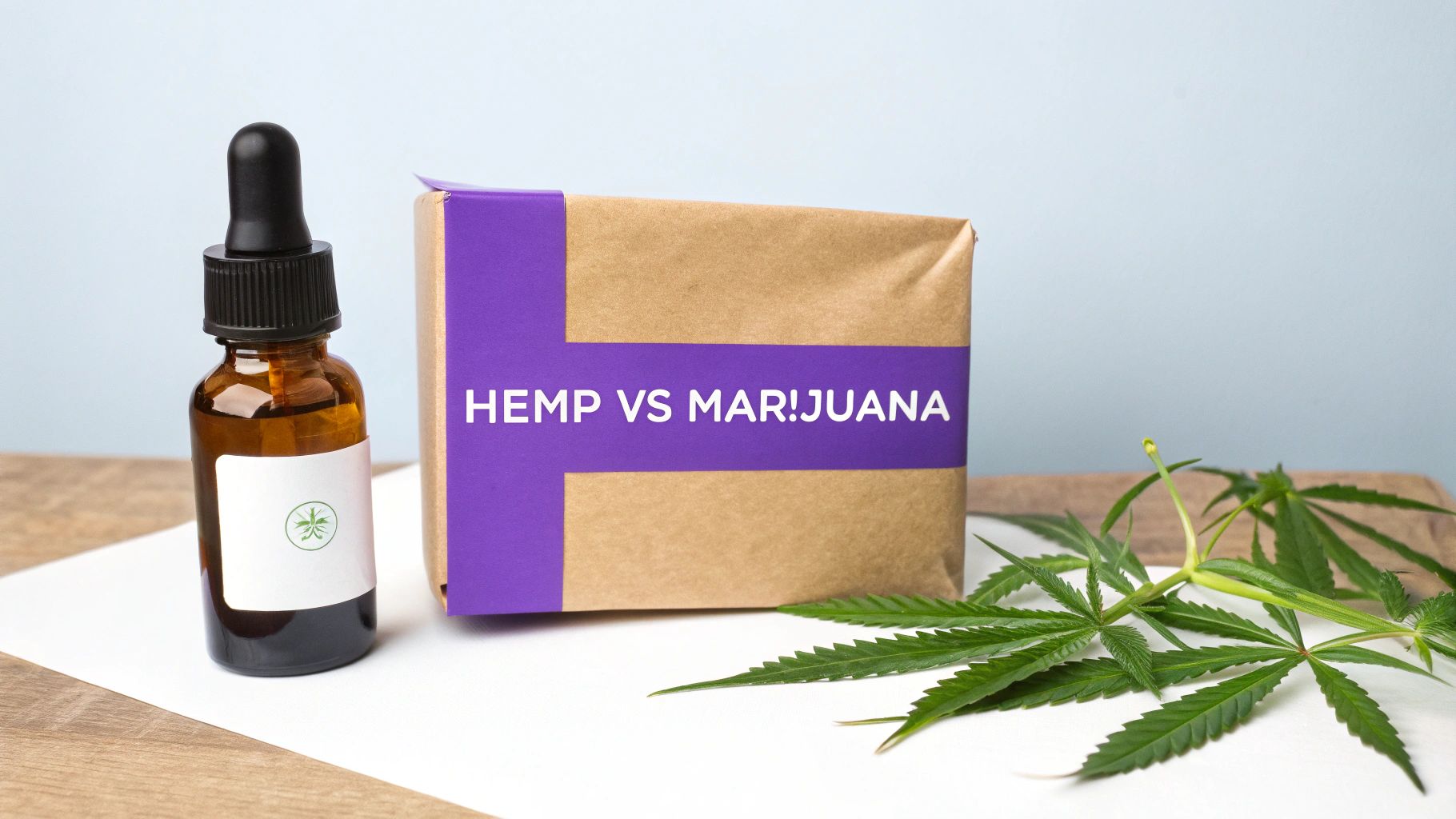
Hemp vs Marijuana Products: Critical Shipping Law Differences You Must Know
Explore Hemp vs Marijuana Products: Critical Shipping Law Differences. Learn key federal, state, and carrier regulations to ensure compliant shipping.
Cody Y.
Updated on Sep 27, 2025
When it comes to shipping cannabis products, everything boils down to one critical number: 0.3% THC.
Simply put, federally legal hemp products—those with 0.3% or less THC—can be shipped across state lines using standard carriers like USPS. Anything above that threshold is considered marijuana, a federally controlled substance, making its interstate shipment illegal. This sharp legal divide comes directly from the 2018 Farm Bill, which created two completely separate pathways for cannabis based entirely on that THC percentage.
Unpacking the Fundamental Legal Divide
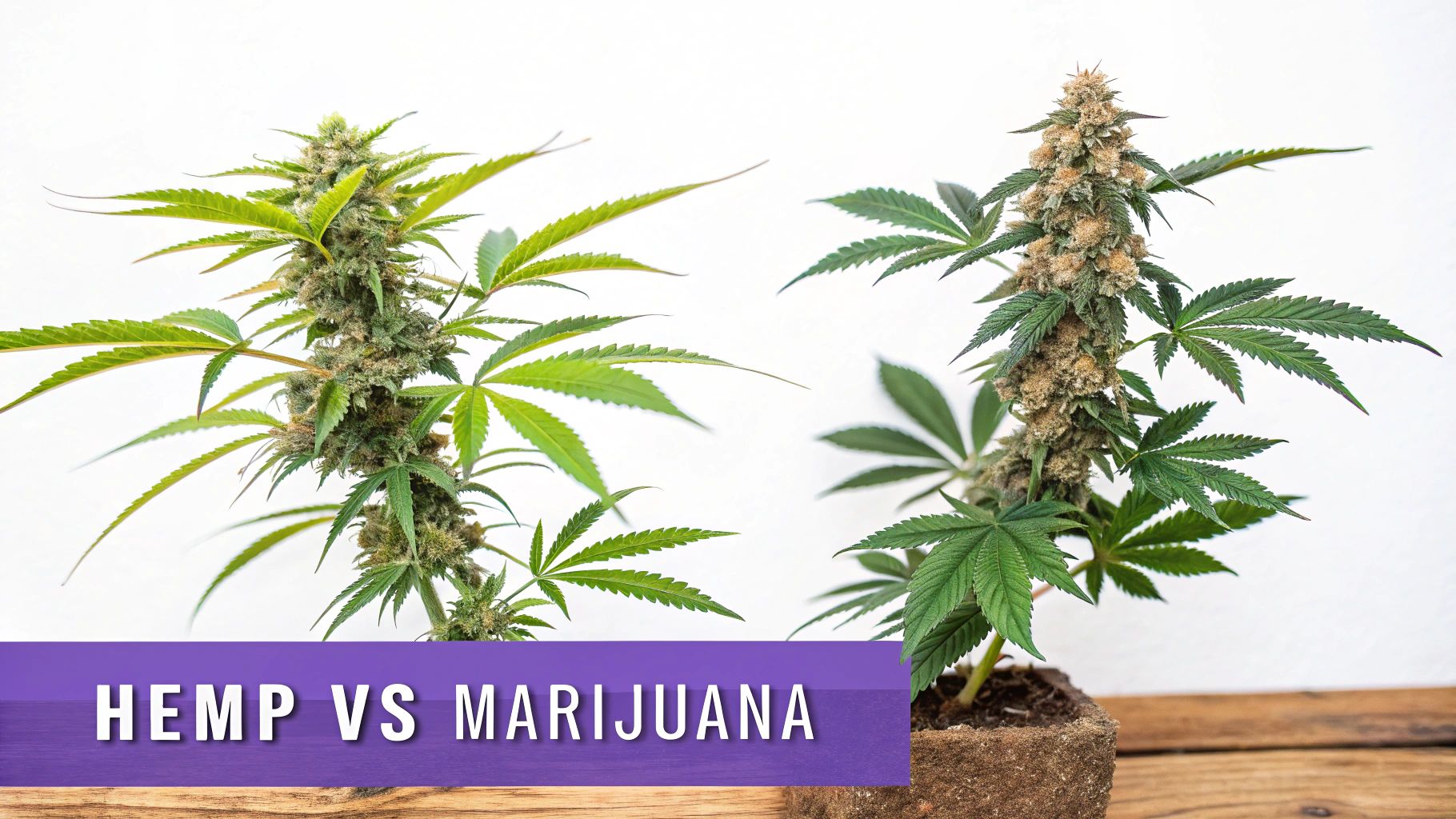
To really get a grip on shipping regulations, you have to start with that single piece of landmark legislation. The Agricultural Improvement Act of 2018, better known as the 2018 Farm Bill, completely changed the game by federally de-scheduling hemp.
The act defined hemp as the Cannabis sativa L. plant and any part of it containing a delta-9 THC concentration of no more than 0.3% on a dry weight basis. This one metric drew a clear line in the sand, legally separating compliant hemp from federally illicit marijuana.
As a result, any product meeting this strict THC limit became a legitimate article of commerce. Suddenly, businesses could produce, sell, and ship hemp-derived items like CBD oils, textiles, and topicals across state lines without the threat of federal prosecution. But any product tipping over that 0.3% THC mark remains classified as marijuana under the Controlled Substances Act, subjecting it to a far more restrictive set of rules.
The Impact of the 2018 Farm Bill
The bill's passage was a game-changer, but it also introduced a new layer of compliance headaches for shippers. Its main effects on shipping can be boiled down to a few key points:
- Opened Interstate Commerce: It gave the green light for shipping compliant hemp products through major carriers.
- Created a Documentation Burden: Shippers now have to prove their products are legal, which almost always means having a Certificate of Analysis (COA) on hand.
- Left Marijuana Untouched: The federal ban on shipping marijuana products stayed exactly where it was.
The United States Postal Service (USPS) moved quickly to align its policies with the new law. Today, hemp products with 0.3% or less THC are mailable, as long as shippers follow all other applicable federal, state, and local laws. You can dig into the official USPS guidelines for shipping hemp-derived products to see their exact requirements. This federal acceptance, however, does not extend to marijuana in any form.
Hemp vs Marijuana Shipping at a Glance
For a quick summary, this table breaks down the essential legal and logistical differences between shipping hemp and marijuana products. It highlights why one is a standard e-commerce product and the other remains off-limits for interstate shipping.
| Attribute | Hemp Products (≤0.3% THC) | Marijuana Products (>0.3% THC) |
|---|---|---|
| Federal Legal Status | Federally legal under the 2018 Farm Bill | Federally illegal (Schedule I substance) |
| Interstate Shipping | Permitted via USPS, FedEx, UPS | Strictly prohibited |
| Required Documentation | COA, producer licenses, legal compliance | N/A (cannot be legally shipped) |
| Carrier Acceptance | Accepted by major carriers with rules | Rejected by all major carriers |
As you can see, the distinction is night and day. While hemp products move through the mail system with the right paperwork, marijuana is a non-starter, blocked by federal law and rejected by every major carrier.
How Federal Law Defines What You Can Ship
At the core of the entire hemp versus marijuana shipping puzzle is one single number: 0.3% delta-9 THC. That’s it. This threshold, established by the landmark 2018 Farm Bill, is the only thing that legally separates federally legal hemp from federally controlled marijuana. For any business shipping cannabis products, everything starts here.
On paper, the rule seems simple enough. If a product contains 0.3% or less delta-9 THC on a dry weight basis, the federal government considers it hemp, free to move across state lines. But the moment it tips over that line, even by a tiny fraction, it becomes marijuana, and shipping it becomes a federal crime.
This razor-thin distinction creates massive real-world headaches for legitimate businesses. The biggest problem? Hemp and marijuana plants look, smell, and feel completely identical. This simple fact puts every legal hemp shipment at risk of being seized by law enforcement purely on suspicion.
The Problem of Perception and Enforcement
A truck loaded with tons of legal, lab-tested hemp flower looks exactly like a truck trafficking illegal marijuana. This visual similarity is a logistical nightmare, frequently leading to confusion, costly delays, and wrongful seizures of perfectly legal products.
Law enforcement officers can't tell the difference on the side of the road, which is why we’ve seen so many reports of legal hemp shipments being impounded. This constant threat highlights just how crucial it is to have precise lab reports and impeccable documentation for every single shipment. You can find more details on these common interstate hemp shipment challenges.
Key Takeaway: The burden of proof is 100% on the shipper. Your legal hemp shipment is treated as an illegal drug transport until you can prove otherwise with immediate, verifiable paperwork like a Certificate of Analysis (COA).
This reality means rigorous documentation isn't just a good idea—it's your shipment's passport. Without it, your product is stuck, and you’re facing a potential legal battle to get it back.
Understanding the Risk of "Hot" Hemp
Another major complication is the risk of "hot" hemp—a crop that tests above the 0.3% delta-9 THC limit after harvest. This can happen for a lot of reasons, from plant genetics and growing conditions to when and how the plant was harvested.
For growers and distributors, a "hot" crop is a financial and legal disaster. A valuable asset that was compliant in the field can suddenly become a federally illegal substance by the time it’s ready to ship, turning potential profit into a liability that has to be destroyed.
The consequences are severe:
- Product Confiscation and Destruction: Any hemp that tests "hot" is considered marijuana. It must be disposed of under strict government regulations, meaning a total loss of your investment.
- Potential Legal Action: Even if it's unintentional, producing hot hemp can draw unwanted attention from regulators, possibly leading to heavy fines or even the loss of your cultivation license.
- Supply Chain Disruption: One failed test can bring your entire operation to a standstill. It causes massive delays and can ruin relationships with buyers who depend on you for compliant materials.
This unforgiving standard makes constant, accurate testing a non-negotiable part of risk management. For shippers, verifying the compliance of every batch isn't just a best practice; it's the only way to avoid unknowingly trafficking a controlled substance. The federal definition is absolute, and there is zero room for error.
Navigating the Complex Maze of State Shipping Laws
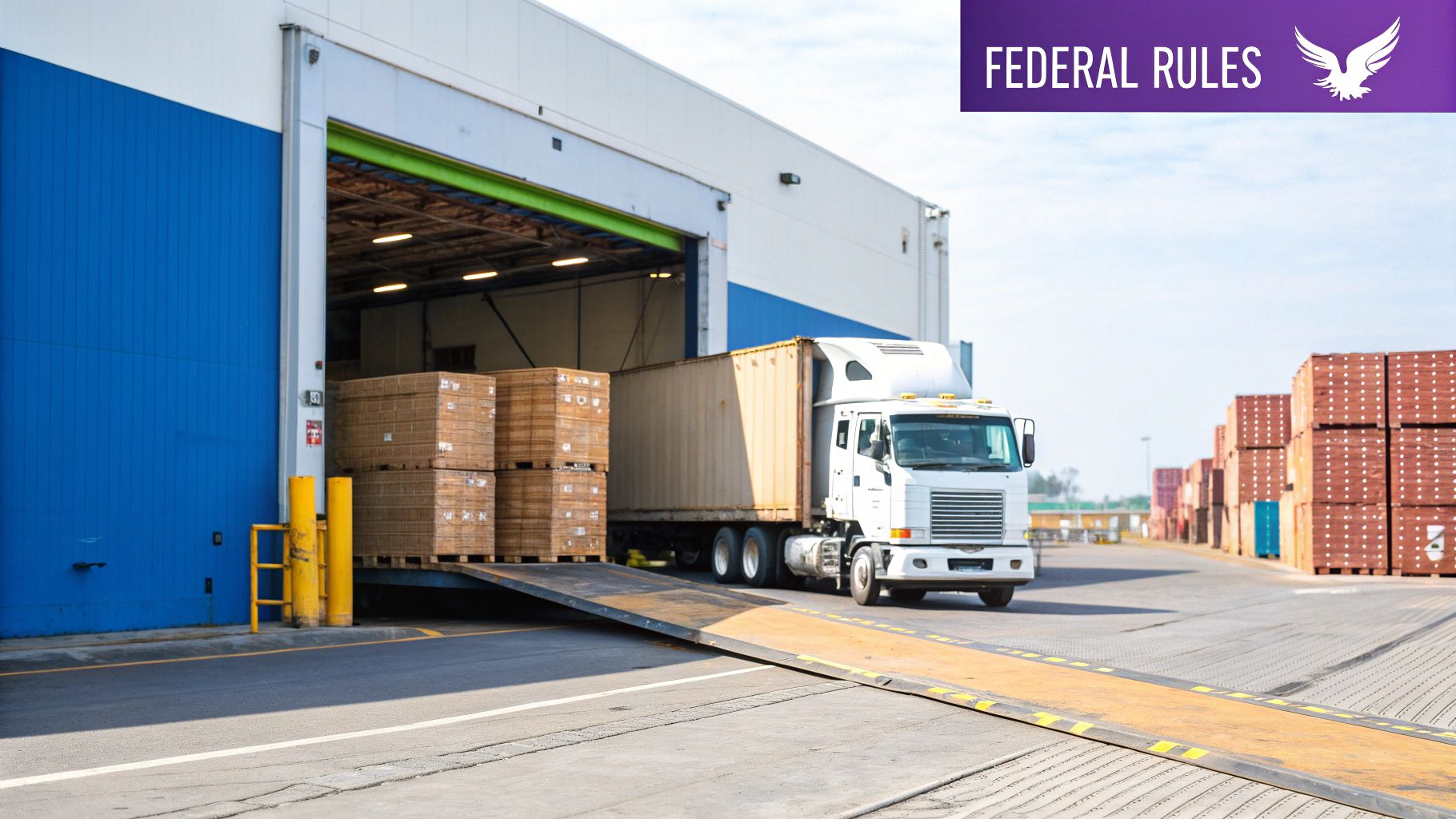
While the 2018 Farm Bill cracked the door open for interstate hemp commerce, it didn't exactly create an unregulated free-for-all. Far from it. Federal legality is just the first hurdle. The second, and often trickier one, is the tangled web of individual state laws governing hemp and marijuana products within their borders.
Each state holds the full authority to regulate or even prohibit certain hemp-derived products, no matter what federal law says. This has created a confusing patchwork of rules where a product that’s perfectly legal to ship from one state might be illegal to ship to another. For any e-commerce business, this is a compliance minefield.
Trying to understand the shipping differences between hemp and marijuana gets exponentially harder when you start digging into state-level nuances. Ignoring them is a fast track to seized shipments, legal headaches, and lost revenue.
When State Laws Override Federal Guidelines
The biggest complications pop up when states take a much tougher stance than the federal government. A perfect example is the regulation of specific cannabinoids like Delta-8 THC. Even though it’s derived from federally legal hemp, a growing number of states have moved to ban or severely restrict its sale and shipment.
Imagine this very real scenario: your company is based in a state where Delta-8 is legal. You get an online order from a customer in a state that has explicitly outlawed the substance. Without a solid system to check the destination address against state-specific rules, you could accidentally commit a crime just by fulfilling the order.
This isn't just about Delta-8, either. States have unique, and often stringent, requirements for other things, too:
- Labeling and Packaging: Some mandate specific warnings, QR codes that link to lab results, or child-resistant packaging that goes way beyond federal recommendations.
- Potency Caps: Others limit the total THC allowed in a single package or serving, even if the product meets the federal 0.3% delta-9 THC threshold.
- Product Types: Certain states have banned entire categories, like smokable hemp flower or CBD-infused food and drinks.
If you don't comply with these destination-specific rules, your shipment could easily be flagged, confiscated, and destroyed by state authorities. That leaves both you and your customer in a very tough spot.
The Absolute Need for Due Diligence
Given this complexity, a "ship it and forget it" attitude is a recipe for disaster. Every single transaction has to be vetted against the laws of the destination state. This level of due diligence isn't just a good idea—it’s non-negotiable for staying compliant and protecting your business.
A common mistake is assuming that federal hemp legality preempts state law. The 2018 Farm Bill explicitly preserves the authority of states to enact their own, more restrictive regulations on hemp production and sales.
So, how can any business possibly keep up with 50 different sets of rules that are constantly in flux? Manually checking every order is impractical and an open invitation for human error, especially as your business grows. This is where technology and specialized resources become absolutely essential.
For any business shipping hemp-derived products, a proactive compliance strategy is critical. A great starting point is to explore a complete 2025 compliance guide to CBD shipping laws by state, which breaks down these varied regulations in detail.
Ultimately, automation is the most reliable way forward. Using shipping restriction software built for e-commerce platforms can automatically block orders from prohibited areas. These tools use geo-targeting to check a customer’s address against a database of state, county, and even city-level restrictions, stopping illegal sales before they ever happen. This automated approach turns a logistical nightmare into a manageable, background process, ensuring every package you send is a compliant one.
Alright, you've sorted out the federal and state laws. The next major hurdle is figuring out the specific rules each major shipping carrier has for hemp products.
Just because the 2018 Farm Bill made hemp federally legal doesn't mean carriers like USPS, FedEx, and UPS were suddenly required to ship it. They weren’t. Instead, each company put its own policies and documentation requirements in place, and you have to follow them exactly.
Getting these carrier-specific rules right is just as important as knowing the law. One mistake can get your packages rejected, your shipping account suspended, or your products seized—even if they're perfectly legal. The one thing they all agree on? None of them will knowingly touch any form of marijuana or any product with over 0.3% THC.
The image below breaks down the key legal differences that drive these carrier policies.
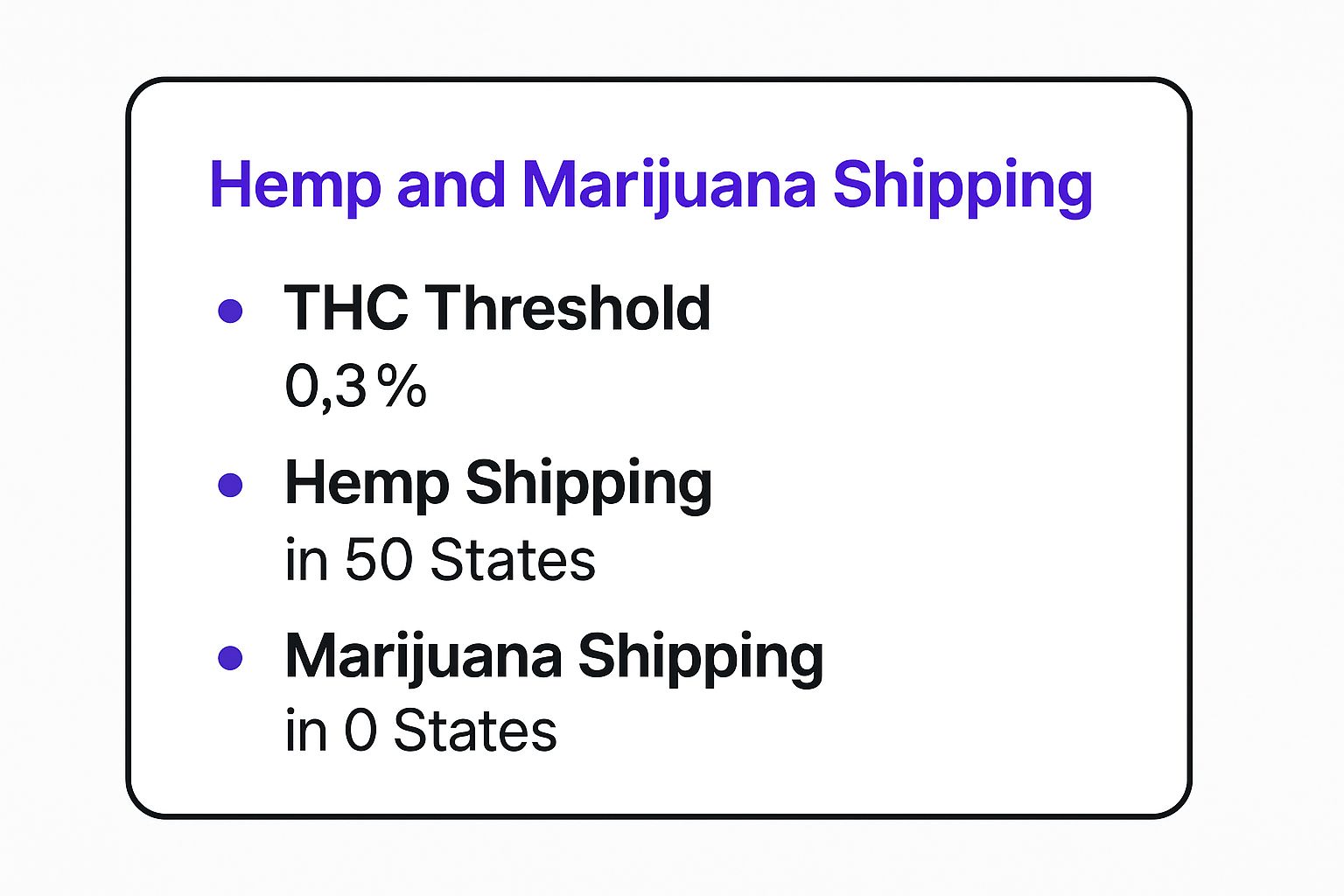
This visual really drives home the core distinction: federally legal hemp can be shipped across all 50 states, but marijuana is completely banned from interstate shipping. No exceptions.
United States Postal Service (USPS) Rules
As a federal agency, USPS was one of the first out of the gate to update its rules after the 2018 Farm Bill. Their policies are widely seen as the most straightforward for hemp shippers, but there’s a catch: the entire burden of proof is on you, the mailer, to prove your products are compliant.
If you’re shipping hemp with USPS, you need to have specific documents ready to go at a moment's notice:
- Producer's License: A copy of the license issued by a state's Department of Agriculture that authorizes the grower to cultivate hemp.
- Certificate of Analysis (COA): A lab report from an accredited third-party lab confirming the delta-9 THC level is at or below 0.3% on a dry weight basis.
You don’t have to stick this paperwork inside every single box, but you absolutely must have it on file. If USPS ever questions your shipment, you need to produce it immediately.
FedEx and UPS Requirements
Private carriers like FedEx and UPS have more leeway in what they decide to carry. Both will ship hemp and hemp-derived products, but their rules are often much stricter than what you'll find with USPS. They also make it very clear that they can inspect and reject any package they suspect contains something non-compliant.
Carrier Policy Insight: FedEx's official policy is a bit confusing. It states, "FedEx does not accept for shipment any marijuana... or any hemp plants, hemp leaves, hemp oil, or CBD derived from hemp." But they immediately follow up with an exception for government-approved products containing CBD from hemp with no more than 0.3% THC.
Both FedEx and UPS put the full responsibility on the shipper to comply with all federal, state, and local laws. This means your product not only has to be legal where it’s coming from but also where it’s going. If you want a deep dive into the nuances of carrier rules, you can find more details in comprehensive guides on hemp shipping rules and restrictions.
Ultimately, you’ll need the same kind of documentation for FedEx and UPS as you do for the post office—a valid COA and proof of a grower’s license are non-negotiable. Be prepared for more scrutiny when using these private carriers and keep immaculate records for every single shipment. It's the only way to avoid disruptions.
To make this easier to digest, here's a quick checklist summarizing what each carrier expects.
Carrier Compliance Checklist for Hemp Shipments
This table outlines the essential documentation and compliance steps you’ll need to follow when shipping hemp products with the major carriers.
| Compliance Step | USPS Requirement | FedEx/UPS Requirement |
|---|---|---|
| Proof of Legality | Shipper must retain a copy of the producer’s license and be able to produce it upon request. | Shipper must comply with all laws and be prepared to provide proof of the grower’s license. |
| THC Concentration | Must have a Certificate of Analysis (COA) showing ≤0.3% THC on hand. | Must have a COA available, proving the product contains ≤0.3% THC. |
| Packaging | No special markings required. Cannot be odorous or indicate contents. | Must be packaged securely. Right to inspect and reject any suspicious package is reserved. |
| Account Status | Standard mailing rules apply. | Shippers must have an account in good standing and adhere to the carrier's specific hemp policy addendums. |
| Product Origin | Must originate from a licensed U.S. hemp grower. | Products must come from a licensed grower and be legal at both origin and destination. |
While hemp shipping is a matter of careful compliance, remember that shipping marijuana is a matter of strict prohibition across all carriers. Mixing them up is a fast track to serious problems.
Inside the Specialized World of Marijuana Transportation
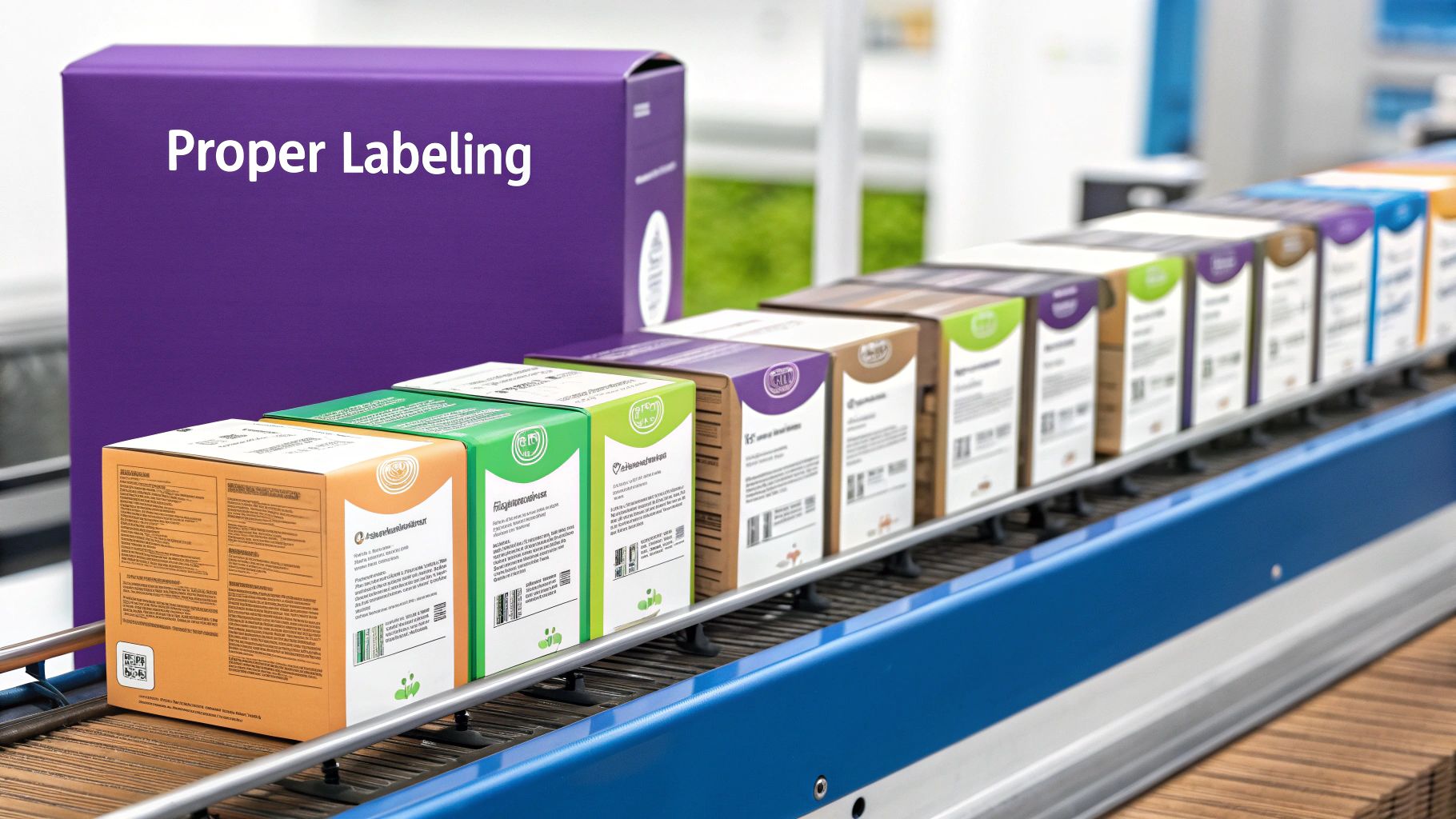
While hemp products get to ride along with public carriers, marijuana logistics operate in an entirely different universe. Because it’s still a Schedule I controlled substance at the federal level, moving state-legal marijuana is a tightly controlled, high-security affair that only happens within a state's borders. It's nothing like shipping a standard e-commerce product.
The most critical distinction is this: you cannot legally ship marijuana across state lines. Full stop. Using standard carriers like USPS, FedEx, or UPS is completely out of the question and would be treated as federal drug trafficking.
This federal roadblock has forced the state-legal cannabis industry to build its own parallel logistics network from scratch. This system relies on specialized, state-licensed transportation companies that function under extreme security and regulatory scrutiny. Think less "delivery van," more "armored car service."
The Role of State-Licensed Logistics Companies
In every state with a legal cannabis market, you'll find a unique class of business licensed exclusively to transport marijuana products. These companies are the connective tissue of the industry, moving products securely between cultivators, processors, testing labs, and retail dispensaries.
Their every move is governed by a strict set of state-mandated rules designed to prevent theft, diversion, or any break in the "closed-loop" system. Unlike hemp shipping, which can go directly to a customer's door, all marijuana transport is strictly business-to-business (B2B) within a single state.
These regulations are incredibly detailed, dictating nearly every aspect of the process:
- Vehicle Security: Transporters must use unmarked, GPS-tracked vehicles. Inside, secure vaults or lockboxes have to be physically bolted to the vehicle's frame.
- Constant Surveillance: Real-time video monitoring both inside and outside the vehicle is standard, with all footage archived for regulatory audits.
- Strict Chain of Custody: Every single plant, gram, and package is tracked through a state-run seed-to-sale system. Detailed manifests must accompany every shipment, accounting for everything down to the last milligram.
- Personnel Requirements: Drivers and guards go through extensive background checks and must be officially registered and badged by the state's cannabis control board.
This intricate system ensures that every bit of legal cannabis is accounted for from the moment it leaves a grow-op until it’s sold at a dispensary. It’s a world away from just printing a shipping label for a CBD order.
The High Cost of Secure Transport
All that security doesn't come cheap. Marijuana transport relies on highly regulated, state-licensed distributors who have to navigate a complex patchwork of state-specific rules. Their shipping vehicles must meet stringent security requirements, including lockboxes, GPS tracking, and temperature control systems—often costing hundreds of thousands of dollars to outfit properly.
On top of that, insurance premiums are sky-high due to the product's value and risk. You can get more insights on recent cannabis and hemp industry changes for 2024 from mcglinchey.com.
This financial reality creates a huge barrier to entry and drives up the final cost of legal cannabis products for consumers. The expense of maintaining a compliant fleet, paying for specialized insurance, and navigating the regulatory maze is passed down the supply chain.
For cannabis businesses, logistics isn't just a line item—it's a major strategic decision. Picking the right licensed transport partner is vital for ensuring products arrive safely, securely, and in full compliance with state law. The gap between shipping hemp and marijuana isn't just a legal technicality; it's a profound economic and operational divide. It proves that even though they come from the same plant, these two products live in completely separate commercial ecosystems.
Putting Compliance Into Action in Your Business
Navigating the legal maze of hemp versus marijuana products isn't just about knowing the rules—it's about having a rock-solid plan. For any business in this space, that means building a clear framework for your documentation, packaging, and shipping partners. Consumers also have a part to play by making sure what they're buying is legal before they click "checkout."
The whole point is to move your products with confidence, armed with the knowledge to operate safely and legally. This section boils down all the critical distinctions we've covered into a practical, step-by-step game plan for both you and your customers.
A Compliance Checklist for Businesses
To keep risk low and ensure every single shipment is compliant, you need a rigorous internal checklist. This isn't just about dodging legal trouble; it’s about building a brand that customers trust in an industry that’s notoriously complex.
Your day-to-day operations should be built around these essentials:
- Documentation on Demand: You need a current Certificate of Analysis (COA) from an accredited third-party lab for every product batch. Period. Keep a copy of your supplier's hemp producer license on file, too.
- Compliant Packaging: Make sure your packaging is discreet, secure, and doesn't advertise its contents. It absolutely must prevent any odor from escaping, which is a huge red flag that can trigger unnecessary scrutiny during transit.
- Carrier Selection and Policy Adherence: Work with carriers whose policies you can actually meet. Dig into their specific rules for hemp-derived products and never, ever try to ship something that falls into a legal gray area.
The bottom line is this: the burden of proof always falls on you, the shipper. If a shipment ever gets questioned by law enforcement or a carrier, your documentation is your first and best line of defense.
Navigating State Laws and High-Risk Products
Staying compliant is a constant battle, especially with the wild patchwork of state laws. A product like Delta-8 THC might be federally legal, but it’s outright banned in a growing number of states. Shipping it there is a huge risk.
To manage this complex reality, your business must:
- Use Geofencing Technology: Put systems in place that automatically block sales to states where your products are illegal. For any online store, this is non-negotiable. If you need a hand with this, you can learn about configuring CBD and hemp shipping restrictions in WooCommerce.
- Maintain a Restricted States List: Keep an internal, up-to-date list of states with outright bans or specific restrictions on the products you sell. Make it a habit to review this list quarterly, because these regulations are constantly shifting.
- Educate Your Team: Your shipping and customer service staff need to understand the nuances of state-specific laws. One accidental shipment can cause a massive headache, so make sure they're trained to prevent compliance failures.
It's also critical to understand how these regulatory conflicts play out in the real world. For example, the federal stance on marijuana has serious implications for commercial drivers. For a closer look, it's worth understanding what happens after a failed DOT drug test. This is a perfect example of why the clear legal separation between hemp and marijuana is so vital for the entire logistics chain.
Tips for Informed Consumers
As a consumer, you also have a responsibility to make sure you’re buying and receiving products legally. Before you place an online order, take these simple steps:
- Verify Lab Reports: Reputable companies make their COAs easy to find on their websites. Take a look and confirm the product's delta-9 THC content is below 0.3%.
- Know Your Local Laws: A quick search will tell you what your state's laws are for CBD, Delta-8, or other hemp-derived cannabinoids. Don't assume something is legal where you live just because you can buy it online.
- Buy from Transparent Brands: Stick with companies that are open about their sourcing, testing, and compliance practices. If they're hiding something, it's a major red flag.
Common Questions on Shipping Hemp vs. Marijuana
Figuring out the difference between shipping hemp and marijuana can feel like splitting hairs, but the legal and financial consequences are huge. Here are the answers to the questions we hear most often.
Can I Really Ship CBD Products to All 50 States?
You’d think so, but the answer is a hard no. While the 2018 Farm Bill made hemp-derived products with less than 0.3% THC federally legal, it also gave states the power to write their own, often much stricter, rules.
This means a product that’s perfectly legal in your state could be banned in another. Some states prohibit smokable flower, others outlaw edibles, and many have unique labeling mandates. You absolutely have to check the laws in the destination state before every shipment, or you risk having your packages seized.
What Happens if My Hemp Shipment Gets Mistaken for Marijuana?
This is a very real—and very expensive—risk. To law enforcement, a box of legal hemp flower looks, smells, and feels exactly like a box of illegal marijuana. If your shipment gets flagged, the burden of proof is entirely on you to prove it's compliant.
This is non-negotiable: every single hemp shipment must include a Certificate of Analysis (COA) from an accredited lab. This document is your only proof that the product’s THC level is at or below the legal 0.3% threshold. It's also smart to include a copy of the producer's hemp license.
Without that paperwork readily available, your legal shipment will be treated like a drug trafficking attempt. That means, at best, costly delays and lost product; at worst, serious legal trouble.
Can I Use USPS, FedEx, or UPS to Ship Marijuana Within a Legal State?
Absolutely not. This is a common and dangerous misconception. All major carriers—USPS, FedEx, and UPS—follow federal law, not state law. And under federal law, marijuana is still a Schedule I controlled substance.
Attempting to ship marijuana through any of these carriers is a federal crime, plain and simple. It doesn’t matter if the package is going from one side of Denver to the other. All legal intrastate cannabis transport must be handled by specialized, state-licensed logistics companies that operate under strict seed-to-sale tracking and security protocols.
Keeping these complex rules straight is a full-time job. Ship Restrict automates your compliance, letting you set granular shipping rules by state, county, or even ZIP code. Stop worrying about seized packages and protect your business. Visit https://shiprestrict.com to see how it works.

Cody Yurk
Founder and Lead Developer of ShipRestrict, helping e-commerce businesses navigate complex shipping regulations for regulated products. Ecommerce store owner turned developer.